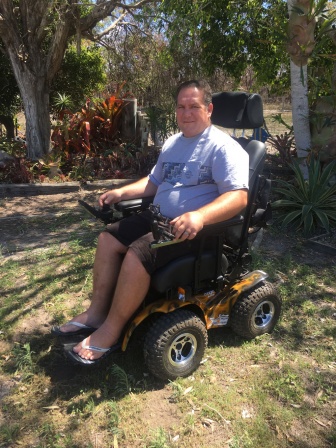Bundaberg couple Aaron and Donna Corr’s lives were turned upside down when Aaron was involved in what seemed like a minor car accident.
“I was passenger in a mate’s car a couple of years ago when he had a slight bingle and I knocked my head on the door,” Aaron says. “I didn’t think much of it, just had a small egg on my head, so I didn’t bother about going to hospital and went home.”
Donna, who at the time was working shifts as a disability support worker, recalls they both had an afternoon nap after Aaron got home.
“A bit later he went to the kitchen and I heard the sound of something breaking, so I flew in there to find him fitting on the floor surrounded by broken bits of the glass he'd dropped,” she says. “That fit was a grand mal and lasted 45 minutes, the first of several on the day and many more since then.”
A subsequent MRI scan of his brain revealed dark spots on both his left and right hemispheres, unlike most people with epilepsy who have scarring on only one side of their brain. That was when specialists connected the dots with an earlier incident over two decades previously, a motorbike accident Aaron had when he was just 19.
Now 44, Aaron lives with Donna on a rural block and has been diagnosed with a traumatic brain injury and severe epilepsy. He joined the National Disability Insurance Scheme (NDIS) in early 2019 and since then not only have his supports vastly improved his life, they’ve also saved it.
“Among the many things we bought with his funding was an Empatica Watch from America,” Donna says. “It looks like a normal watch but as Aaron starts to fit it sends out cascading alerts to myself, his support worker Scott and our daughter Megan – and if none of us respond, it sends his GPS coordinates to triple zero.”
Aaron has three children and Donna four children from previous marriages, and one of their grandchildren, Jace, lives with them.
“Our kids Megan and Tamika were wonderful (and still are) because at the time I was still working full time and they had to look after Aaron while I was at work,” Donna says. “I’ve since retired but once Aaron had his NDIS plan I was able to return to work for a bit, and go back to being a wife.”
Scott takes Aaron out and about for a few hours five days a week, a cleaner comes in for two hours a week, and Donna has recently employed another NDIS participant to mow the lawn on their 7.5 hectare property – all paid for by Aaron’s NDIS plan.
He also has an electric wheelchair, a push wheelchair, a commode chair for the bathroom, an exercise bike to help maintain his fitness, special cutlery and three Google home minis spread around the house so that he can ask questions if he gets disoriented when alone.
Most recently Aaron has received a new hospital bed for himself and a companion bed for Donna.
“Aaron has regained a lot of his independence now,” Donna says. “We’re finally back to being husband and wife, it’s time to enjoy family life and do things we want to do.”
Source: NDIS

